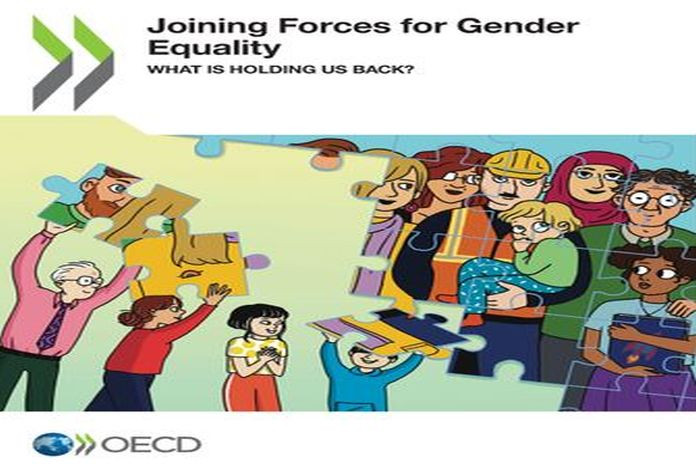PARIS, France, (OECD) – Despite progress in recent years, more work needs to be done, across all OECD countries, to secure gender equality, with women and girls still facing inappropriate disadvantages and barriers in most spheres of social and economic life, according to a new OECD report.
The report Joining Forces for Gender Equality: What is Holding us Back? shows progress in some policy areas, such as paternity leave, pay transparency, flexible work opportunities and higher representation of women in leadership roles. However, major challenges remain, including the need to boost girls’ participation in educational fields promising better job opportunities, lower wages for women than men, barriers to entrepreneurship and self-employment for women, gender gaps in lifetime earnings and pension income, women’s disproportionate share of unpaid care and housework and women’s underrepresentation in politics and government leadership positions.
Even in those countries that have been at the forefront of gender equality policy, women and girls continue to face barriers and disadvantages at home, in the labour market and in public life, says the report. Girls are now, on average, better educated than boys, but still under-represented in educational fields that promise better job opportunities, such as science, technology, engineering and mathematics (STEM). On average across the OECD, only one in five new university students in ICT studies was a woman (based on 2020 data).
Lower employment rates, fewer working hours per week, substantial labour market segregation, and persistent glass ceilings mean that women get paid lower wages than men. Almost 60 percent of public employees are women but they make up less than 40 percent of managers in public employment. Women also face barriers to entrepreneurship and self-employment. Closing gaps in labour force participation and working hours has the potential to drive an average 9.2 percent boost to GDP across OECD countries by 2060, adding about 0.23% to average annual growth. On average across the OECD, women also spend twice as much time on unpaid care and housework than men.
Recent crises including the COVID-19 pandemic and Russia’s war of aggression against Ukraine present new gender equality challenges that countries must tackle through innovative policymaking, with women more likely to suffer heavier economic and financial consequences, such as energy poverty, due to gender gaps in savings and income.
“Even though girls and young women have higher educational attainment, men continue to be more likely to be employed, earn more on average, be in decision-making positions in the public and private sector and engage in entrepreneurship activities compared to women,” OECD secretary-general Mathias Cormann said.
“At the same time, ongoing crises – the COVID-19 pandemic and its lingering effects, the impact of Russia’s war of aggression against Ukraine, as well as sharp increases in the cost-of-living threatens to erode some of the progress made on gender equality over the past decade. We need to step up our efforts to address prevailing and emerging gender gaps, which will help boost growth, productivity, competitiveness and the strength, resilience and sustainability of our economies.”
Attention to gender inequalities has extended to more policy areas, including foreign direct investment, the environment, energy, nuclear energy, trade, and transport, where, as the report notes, major progress is needed to close existing gaps. This also requires urgent action to eradicate any forms of gender-based violence, identified by most OECD countries as their first priority for gender equality.
Among the other recommendations are that countries should continue to work towards addressing gender stereotypes, supporting women’s labour market participation and a more equal distribution of paid- and unpaid-work between men and women, promoting a better representation of women in policy-making across all policy areas and sectors, and ensuring the collection of gender-disaggregated data.





